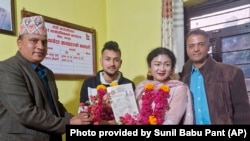Celebrations erupted in Nepal’s LGBTQ community when Maya Gurung, a transgender woman and Surendra Pandey, a man, were given a marriage certificate last week. It was hailed as a historic milestone for the community in the tiny, mountainous country.
"This is first in South Asia. We are very excited for the sexual gender minority communities in Nepal,” Sunil Babu Pant, LGBTQ rights activist in Nepal told reporters. He said it will open the door for them to jointly open bank accounts, own and transfer property like other couples do.
Gurung and Pandey were the first couple from the community whose marriage was registered in Nepal, following a June interim Supreme Court order in June allowing registration of non-heterosexual marriages. The court has directed the government to frame laws for such unions.
Despite the court order, the couple, who held a wedding ceremony according to Hindu rituals in 2016, still faced hurdles in legalizing the marriage. A district court had refused to register their marriage citing lack of necessary laws, but municipal authorities in the rural Lamjung district issued the certificate.
Nepal is the second Asian country, after Taiwan, to grant the right.
But while Nepal took a giant leap forward in LGBTQ rights, efforts to advance similar rights in neighboring India hit a roadblock when the country’s top court rejected pleas to legalize same-sex marriages. It said that it was up to Parliament to create laws to legalize such unions after the government argued that the court was not the forum to decide the issue.
India’s Hindu nationalist government has strongly opposed same-sex marriages calling support for them “urban elitist views,” and saying that such marriages are not compatible "with the Indian family unit concept of a husband, a wife and children.” Religious leaders have also raised objections to such marriages.
The October judgment came as a huge disappointment to the country’s LGBTQ community. It is nevertheless gearing up to press ahead with its campaign for equal rights.
Some activists are now focusing on rallying political support.
“For any sustained change in LGBTQ issues in India, we need to engage with our politicians, we need to ensure that queer rights become an issue in the legislative arena, in Parliament, in our state legislatures, in our city councils,” said Ashish Gawande, who launched Pink List, the country’s first roster of politicians that support LGBTQ rights, during the 2019 parliamentary elections.
“We need to ensure that LGBTQ people are not begging for rights in the courtroom but demanding for rights in the streets,” Gawande said.
As political parties gear up for India’s national elections next year, activists also aim to lobby regional parties, which control over one-third of parliamentary seats and govern several states.
“You can convince smaller parties that their support for LGBTQ plus rights will get them not only national recognition but also the kind of social, cultural and economic capital they need,” said Gawande.
Legal options are already being explored – review petitions have been filed in the Supreme Court regarding its judgment.
Lawyers point out that the judges had called on the government to end discrimination against the LGBTQ community and sensitize the public about LGBTQ rights.
“Everybody acknowledges that there is discrimination. If you are seeing a wrong, it is your duty as a constitutional court to right that wrong which the court has failed to do,” according to Rohin Bhatt, one of the lawyers involved in the marriage equality case.
Activists will also intensify their campaign for social change in a largely conservative country where homosexuality still carries a stigma, despite a shift in attitudes in urban areas and among the middle classes in recent years. Laws criminalizing homosexuality were only struck down in India five years ago.
“Social movements can’t be won just in courts. Winning a case is easier than winning hearts and minds. But some of us have to go on the ground and advocate for everything day in and day out,” said Bhatt.
While the LGBTQ community is aware that the next phase of the battle will be long, there is optimism. At the gay pride march held in the Indian capital 10 days ago, about 2,000 participants danced and held up banners in support of same sex-marriage in support of equality for the LGBTQ community.
“Leading up to the national elections and leading up to most certainly toward the next decade or so, you are going to see more young people come out, more young people demand to be heard and more young people demand the change we need today,” said Gawande.






